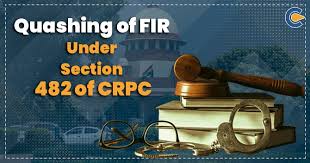QUASHING OF A COMPLAINT UNDER SEC.482
Legal Provisions in India for Quashing of Criminal Proceedings
Code of Criminal Procedure, 1973 has laid out the provisions for quashing of criminal proceedings. Section 482 o CrPC says, "Saving of inherent powers of High Court Nothing in this Code shall be deemed to limit or affect the inherent powers of the High Court to make such orders as may be necessary to give effect to any order under this Code, or to prevent abuse of the process of any Court or otherwise to secure the ends of justice." The decisions of High Courts ought to be guided by following twin objectives for quashing of a complaint/ criminal proceedings, as laid down in Narinder Singh v. State of Punjab:
- Prevent abuse of the process of court.
- Secure the ends of justice.
Section 482 of CrPC that deals with the power of court to quash criminal proceedings, does not specify the details of what exactly constitutes the inherent power of court. In that sense, the Code is very vague as it does not lay out the grounds on which the foundations of the inherent power of court lay.

